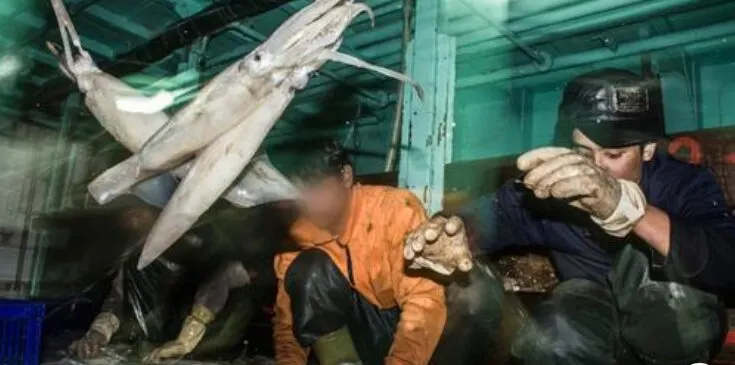
Taiwan's Foreign Fishermen Representatives and their Indonesian counterparts will meet with officials from the Fisheries Agency, Ministry of Labor, and the Indonesian Representative Office in Taipei on March 1st, in an unprecedented move. The meeting aims to discuss a significant agreement under negotiation between Taiwan and Indonesia, affecting the labor standards of thousands of foreign fishermen.
The Indonesian Fishermen Union and workers' organizations will present their demands, urging the Ministry of Foreign Affairs to engage in discussions regarding the ongoing memorandum of understanding (MOU) negotiations between Taiwan and Indonesia. This marks the first joint effort by labor unions from both countries advocating for higher standards for foreign fishermen. However, as of now, the fishermen themselves have not been invited to participate in discussions that impact their rights.
Senior Researcher Yi-Hsiang Shih from the Taiwan Association for Human Rights emphasized, "How can the government negotiate labor rights issues for fishermen without listening to their opinions? The negotiation process should not be conducted in secrecy. We expect transparency from the Taiwanese government, just as the memorandum affecting every Taiwanese table should be."
The visit by the Indonesian union coincides with their ongoing visit to the United States. Representatives from the U.S. Department of Labor's Bureau of International Labor Affairs met with the Ministry of Labor on Monday, urging Taiwan to commit to "improving labor law compliance." On Tuesday, the U.S. Department of Labor's Bureau of International Labor Affairs also met with union representatives, including those from fishermen's unions, to "understand their experiences and ensure that we reflect labor rights issues to policymakers, allowing workers to speak for themselves."
This heightened activity in the fishing industry follows Taiwan's recent signing of a memorandum with India, precisely at a time when issues related to fishermen are in the spotlight. The demands of the Indonesian fishermen's delegation include incorporating basic labor rights, providing Wi-Fi, ensuring fair wages, and holding employers accountable for instances of worker abuse in the MOU. The delegation will present similar demands to the Indonesian government next week, facilitating continued dialogue.
Achmad Mudzakir, Chairman of the Forum Silaturahmi Pelaut Indonesia (FOSPI), stated, "We unite internationally to voice our demands. We stand together, urging Taiwan to follow international best practices, fulfill its commitments, and support the labor rights of all workers, including those outlined in international agreements."
Syofyan, Secretary-General of Serikat Awak Kapal Transportasi Indonesia (SAKTI), commented, "Migration is of a transnational nature, so should be social dialogues related to migration. Allowing workers to directly engage with the governments of Taiwan and Indonesia is crucial. As union officials, we hope to ensure that Indonesian fishermen receive protection from their hometowns to their workplaces and until they return."
The Indonesian union delegation includes Serikat Pekerja Perikanan Indonesia (SPPI) / Indonesian Fisheries Workers Union, Serikat Buruh Migran Indonesia (SBMI) / Indonesian Migrant Workers Union, Serikat Awak Kapal Transportasi Indonesia (SAKTI) / Indonesian Transportation Workers Union, Serikat Awak Kapal Perikanan Bersatu Sulawesi Utara (SAKTI Sulut) / North Sulawesi United Fisheries Workers Union, and Persatuan Pelaut Borneo (PBB) / Borneo Seafarers United Union. In addition, the Taiwan union Forum Silaturahmi Pelaut Indonesia (FOSPI) representing Indonesian fishermen in Taiwan will also participate.
The advocacy group "Wi-Fi Now for Immediate Realization of Fishermen's Labor Rights" will also attend the meeting. This initiative brings together Indonesian fishermen and their workers' organizations, collaborating with Taiwanese and international allies to ensure Wi-Fi access at sea, enabling the realization of basic labor rights, including freedom of association, safe working conditions, and an end to forced labor.
Taiwan's distant water fishing industry exports seafood, including tuna and squid, with an estimated value of around $1.8 billion annually. However, evidence and reports indicate the presence of forced labor on Taiwanese fishing vessels, prompting the U.S. government to include Taiwanese seafood in the "List of Goods and Countries Reasonably Believed to be Produced by Child or Forced Labor" in 2022.
〔TAIWAN NEWS / Reporter Sheng-Yi Li / Taipei Report〕2024-02-28
〔Photo from TAIWAN NEWS〕
